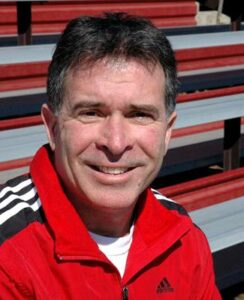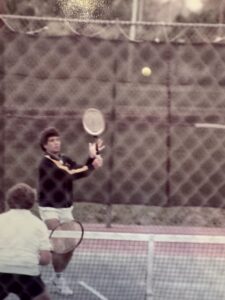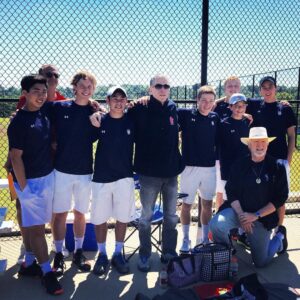Inductees
Dale Eshelbrenner


To understand the lasting impact of Dale Eshelbrenner, just listen to those who played for him – or coached with him – in his days leading the Pembroke Hill School tennis programs.
“My favorite memories of Dale were watching him be so strict with the team one day,” said Joshua Bortnick, a 2017 graduate. “I remember thinking, ‘Why is he being so hard on us?’ Then, running up the hill to the courts, I saw little Tyler and Hattie.
“It was the first time that I had seen Dale’s children and, out of nowhere, I saw a coach who had just finished yelling at us morph into a cheerful smiling father who kneeled down to hug his children. I will always remember that moment as my favorite of Dale and what I admired about him most.”
Certainly, Eshelbrenner showed his players the way and left a lasting legacy. In fact, his success is why the Missouri Sports Hall of Fame proudly inducted Eshelbrenner posthumously with the Class of 2024.

Eshelbrenner passed away in 2016 at age 56 following a battle with cancer.
He served as the tennis director at Indian Hills Country Club in the summers beginning in 1989, and that role lasted 27 years. There, the program grew from a handful of players to hundreds of youths and adults.
He then started coaching the boys tennis team at Pembroke Hill School in 1991 and was there for 25 years, having coached the girls and boys teams to a combined 20 state titles. Thirteen of those were for the boys program (MSHOF 2024).
Along the way, Eshelbrenner was named the U.S. Professional Tennis Association’s Coach of the Year in 2012 and received the National Federation of High Schools National Coach of the Year in 2006.
He also taught middle school physical education and was assistant coach to the girls basketball team. And he always had the support of his wife, Sara.

Fortunately for the players under his tutelage, Eshelbrenner grew up in sports, with a dad who was a junior college basketball coach in Fort Scott, Kan.
Eshelbrenner was part of Fort Scott High School’s 1977 state championship basketball team and also won a state tennis title in 1978, his senior season.
He later graduated from Bethany College in 1982, having led the tennis team to a top 10 NAIA finish while he achieved a top 25 national singles ranking.
One of the more compelling stories that shows Eshelbrenner’s impact is from Justin Kaufmann, a 1998 gradauate won the Class 1-3 state singles title in 1998, doing so with his opponent having quite a cheering section.
“With all the heckling, things did get intense, and my antics were a little out of control,” Kaufmann said. “Dale always did a good job calming me down out there, mostly by laughing at me, but in this instance things were a little too emotionally charged with a state singles championship on the line. In the end, despite everything, I emerged victorious, and I’ll always remember this moment that I enjoyed with Dale and others on the team that year.”

Jeff Diskin, a baseball and basketball coach, remembers Eshelbrenner fondly, too.
“Dale loved the brotherhood of coaching,” Diskin said. “He loved the bonds of lasting friendships that were created from time spent coaching youth athletes and competing against other teams with a fellow coach. I loved to watch Dale and (Mark Spigarelli) work together. They had incredible teamwork and chemistry as a coaching tandem. Spig would take the defense and Dale would take the offense. It was rewarding and refreshing to see them strategize for a game, implement the strategy in practice, pull it off during the game, and then go out for a beer afterwards and talk about it again.”
Diskin then added this: “Above all else, Dale loved the relationships that coaching provided; however, in a not-too-distant-second place was the strategy piece and the team-concept piece. For example, people all believe that tennis is an individual sport, but Dale took great pride in emphasizing the team aspect of it.”

Like most successful coaches, Eshelbrenner made sure to tailor his teaching to each player, not forcing the player to conform to a strict guideline.
“Dale’s love of coaching focused on good ol’ fashioned horse sense,” Diskin said. “Dale had a brilliant mind and understood fundamentals and what the right way of doing things were; however, the ‘right’ way did not always apply to everybody, and I think Dale loved figuring out what worked best for each of his athletes.”